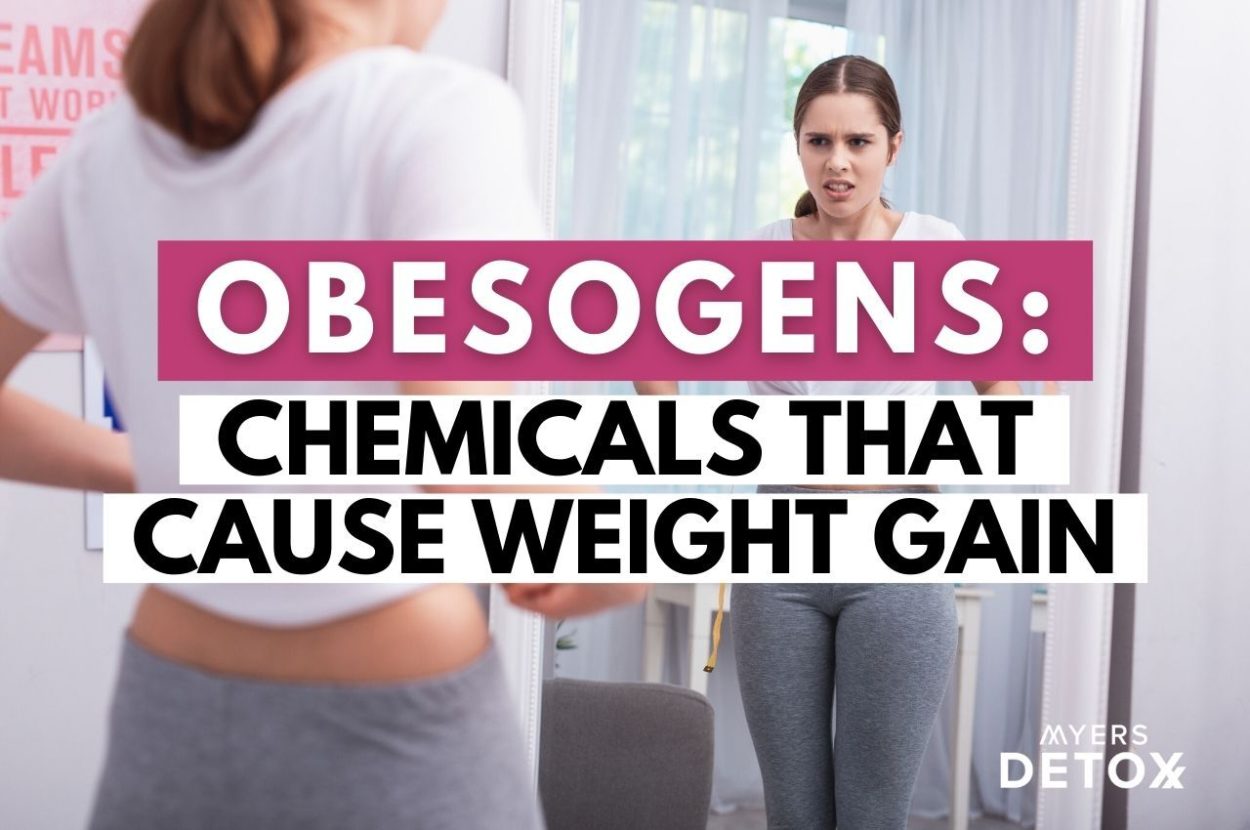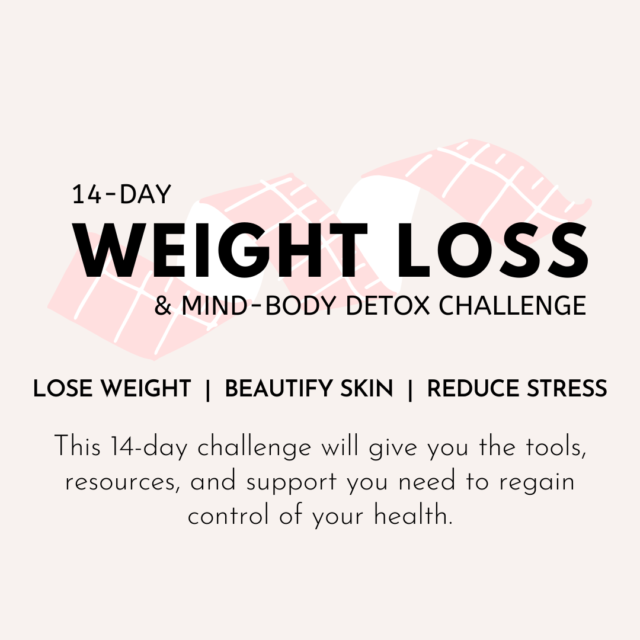Are obesogens behind your weight gain?
According to the Center for Disease Control and Prevention, more than 42% of Americans are considered obese– yet experts can’t seem to figure out the exact cause.
The abundance of sugar and fat in our food supply certainly plays a role, but even with calorie control and more exercise, the obesity epidemic continues to grow. Clearly, something else is at play here, and many experts believe that toxins in our environment are the culprit.
In this article, you’ll learn:
- What obesogens are
- How obesogens alter your hormones and fat cell to promote weight gain
- Common obesogens to watch out for
- How to detox obesogens and finally lose that stubborn weight
What Are Obesogens?
Obesogens are chemicals that are found in the air, food and water and everyday products like beauty products and cleaning supplies. They negatively affect human hormones and change the way our bodies make, store, and use fat.
According to research in both humans and animals, obesogens may cause weight gain (and prevent weight loss) via a handful of mechanisms:
#1 By Increasing The Number Of Fat Cells In Your Body
Obesogenic chemicals can impact the fate of your cells by activating specific receptors that turn stem cells into fat cells. Stem cells have the potential to develop into various types of cells, such as liver, kidney, bone, and so on.
However, in the presence of obesogens, these cells get programmed to become fat cells – whether you “need” them or not. Furthermore, obesogens may also impact cells that are already fat cells by increasing the amount of fat they can hold, making your fat cells even larger.
The result? More fat cells that have a larger capacity for storage[1].
#2 By Disrupting The Function Of Your Hormones
Obesogens are also referred to as endocrine-disrupting chemicals (EDCs) because they have a unique ability to disrupt the function, or mimic, many of the hormones that control your endocrine system.
Of course, your hormones are intimately related to your metabolism, which means EDCs can significantly impact your ability to lose weight.
The way EDCs work is by docking on receptors that are meant for your hormones. Each of your hormones has a unique structure, which fits perfectly on receptor sites that are meant for that hormone’s activities. EDCs have a similar structure to various hormones, which means they can mimic your natural hormones and either upregulate or downregulate your hormonal activity.
Your endocrine system is tightly regulated, which means that the addition of EDCs can throw your homeostasis completely out of whack, with downstream effects such as weight gain, infertility, reproductive harm, insulin resistance, and more[2][3].
#3 By Locking Themselves In Your Fat Cells
As a protective mechanism, your body stores many of the toxins you ingest in your fat cells. Once they are in your cells and out of circulation, they are much less of a threat to your organs.
Unfortunately, due to the number of toxins in our environment today, this tactic is beginning to backfire. In an effort to save your organs, your body may be creating excessive fat cells to sequester away potentially harmful chemicals.
This is why many people struggle with that last five or ten pounds of fat – your body is holding on tight due to the potential toxic load that would be unleashed with fat loss[4]. Your body has to store these toxins somewhere and it is very resistant to releasing this fat.
#4 By Increasing Your Appetite
Finally, obesogens may increase your appetite and promote overeating due to their effect on your hypothalamus. Your hypothalamus is a brain structure responsible for controlling appetite and eating behavior. In the presence of obesogens, the signaling pathways for appetite control become altered, favoring behaviors such as overeating[5].
Common Obesogens To Watch Out For
Obesogens are lurking everywhere in our environment, from the natural world to the food in your cabinets and refrigerator. Below are some of the most common obesogens to be aware of.
Bisphenol A (BPA)
BPA is used in plastics and can commonly be found in bottles and food containers. When the containers that hold your food or beverages contain BPA, there is a risk that it will leach into the products and therefore get a direct route right into your body[6].
MSG (yeast extract)
MSG is a flavoring that’s added to a variety of foods, including broths, soups, canned vegetables, gravies, and other sauces. It’s also very commonly added to Chinese food, so always ask the server at Chinese food restaurants if their food contains MSG[7].
Heavy Metals
Heavy metals can be found everywhere in our environment, food, soil, water, personal care products, even the air that we breathe. Research indicates that heavy metals specifically increase the accumulation of fat tissue in the body[8]
Avoiding heavy metals can be tricky, but the best way to go is to always purchase clean personal care products. Look for companies that pride themselves on clean ingredients and market themselves as safe from unwanted chemicals.
Since metals can also be found in drinking water, always drink filtered water – avoid tap water at all costs. Choosing organic fruit, vegetables, and grains will also help you cut down on metals.
Parabens
Parabens are a type of preservative that can be found in a variety of personal care products, including shampoo, conditioner, facial cleansers, lotions, shower gels, and cosmetics. Parabens help to control the growth of microbes, so they’re most often found in products that contain water[9].
Many natural personal care companies will put “paraben-free” right on their label. If you find a personal care product you like and aren’t sure if it contains parabens, you can also check the ingredients label.
Phthalates
Phthalates are found in personal care products such as perfumes, detergents, nail polish, hair spray, aftershave, soap, and more. Much like parabens, many natural personal care companies will display “phthalate-free” right on the label[10]. You can avoid phthalates by avoiding products with the word fragrance or perfume on the label.
Pesticides, Herbicides, and Insecticides
Pesticides, herbicides, and insecticides are all used in conventional farming to enhance crop output and stave off unwanted pests. Unfortunately, if you buy any fruit, vegetable, grain, or legume that’s non-organic, you can be sure that it’s been sprayed with at least one of these agrochemicals.
Research shows that epigenetics and alterations in the microbiome likely play key roles in the obesogenic effect of these agrochemicals, which can lead to long-term health and wieght issues[11].
To avoid agrochemicals, aim to purchase and consume organic foods as much as possible.
Detox Obesogens To Break Through Your Weight Loss Plateau
While diet certainly plays a crucial role in weight loss, many people hit a plateau due to environmental toxins like obesogens. You could be consuming the freshest, local, organic, nutrient-rich diet but still be stuck with extra pounds of fat due to the toxins you’re holding in your cells.
And, of course, if you continue to consume foods that contain obesogens, then you’re only adding fuel to the fire.
This is why it’s absolutely vital that you not only clean up your diet if you want to lose weight but you also support your body’s detoxification pathways. Don’t forget – your fat cells store obesogens to protect your body, and they won’t budge until they’re sure that your body will be able to handle the toxic load inside of them.
If weight loss has seemed like an impossible feat for you, it’s because losing weight in a toxic world really is a complex matter. That’s why I put together my 14-Day Weight Loss Challenge.
This challenge gives you everything you need to know about how to keep your metabolism high, your hormones balanced, your liver working at top function, and eating a diet clean.
The challenge includes:
- 3 pre-recorded webinars
- 14-day meal plan (with paleo, vegan, and vegetarian options)
- 9 how-do videos for weight loss, emotional eating, stress relief, skin detox, and more
- 14-day meal plan with cookbook
- Access to our ultimate health reset e-library
- And so much more
Takeaway
Losing weight should not be painful, frustrating, or seemingly impossible. In fact, left to its own devices, your body wants nothing more than to keep you happy and healthy. Unfortunately, the level of toxicity in our world today gets in the way and makes weight loss an extraordinary challenge for many people. These toxins poison every organ system and can make it more challenging to lose weight.
I can’t tell you how many people I’ve worked with that eat the perfect diet, workout daily, take all the right supplements, and still can’t shed pounds – until they start detoxing.
If you’re tired of the struggle and want to start tapping into your body’s innate fat-burning capacity, sign up for the 14-Day Weight Loss Challenge to start feeling better today.










